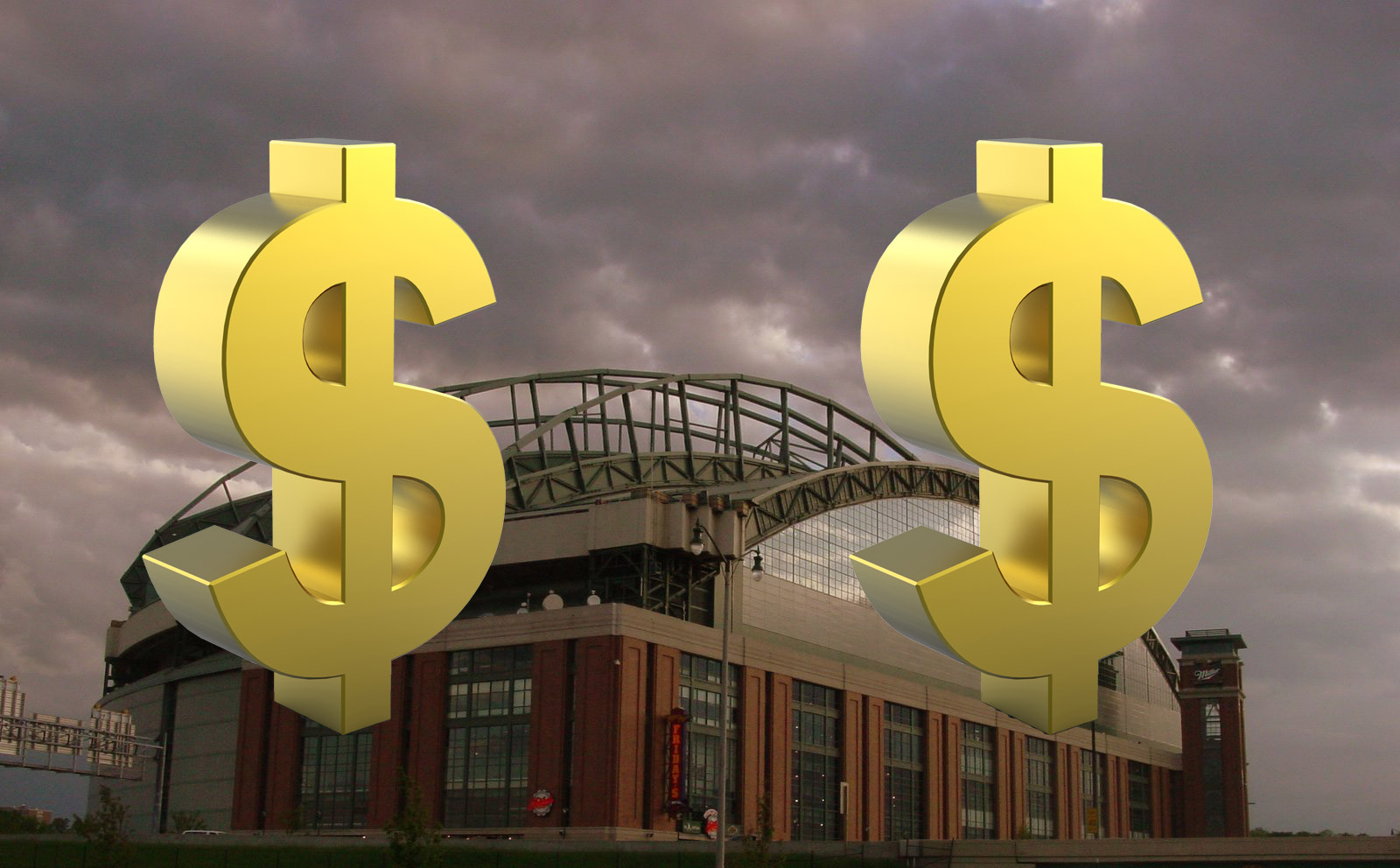Brewers Cost Taxpayers $1.56 Billion
As team prepares to ask for additional stadium subsidy, Urban Milwaukee updates the 40-year cost.
The Milwaukee Brewers new stadium opened in 2001 and by all accounts is expected to last at least until 2040. What has the total cost been for taxpayers? The standard figure used by the media is the $605 million total in sales taxes paid by the five-county, greater metro area. But that figure is incomplete, leaving out many costs and tax exemptions. Under a state law passed to benefit the Brewers, pro sports franchises benefit from a long list of exemptions, including a sales tax exemption on the materials used to build a stadium or arena and a property tax exemption on the facility and land. Thus the Milwaukee Bucks are also beneficiaries while the Green Bay Packers, like all nonprofits in the state, automatically get such exemptions.
Back in April 2001, I did an estimate of the full costs for Milwaukee Magazine, coming up with a figure of $1.116 billion. But this is by now out of date: it did not include later spending on improvements to the stadium, overestimated potential interest costs (the bonds for the stadium were refinanced many times, yielding considerable savings), underestimated the value of the federal tax exemption and overestimated the value of the property tax exemption, all based on the best information at the time. Moreover, it assumed a 30-year life for the stadium. A lifespan of 40 years (or more) adds another decade of exempted property taxes.
The federal tax exemption on bonds used to pay for the stadium is not a small deal. A study by the Brookings Institution estimated that the federal government had lost $4.3 billion in revenue as a result of tax-exempt municipal bonds used for stadium construction since 2000, as the Washington Post reported. In February three members of the House of Representatives proposed a bill to ban this subsidy. The Brookings researchers had earlier estimated the value of this exemption for many teams, finding it totaled $117 million for the Brewers stadium.
Another issue is how to determine the property tax exemption. The assessed value of the Brewers’ land can be fairly estimated based on the that of nearby parcels, but what about the stadium? The audit bureau estimated the cost of construction of the stadium complex at just under $425 million as of December 2001. Since then the public stadium authority has spent another $45 million on capital repairs and improvements to the stadium and has reserved another $87 million to spend between now and 2040. And the Brewers have said they have spent $112.7 million on capital improvements to the ballpark.
Besides the sales tax, all three levels of government – state, county and city – were required to chip in money for the stadium and/or infrastructure. Both the city and county used bonding to pay for costs over time, adding interest expenses. The state also had to pay for infrastructure demanded by the CMC company, as part of an “imbalanced” land swap that secured needed land for the stadium project.
Finally, it should be noted that the Brewers have already warned that they will want more public funding over the next two decades, which is likely to increase the total public subsidy. But for now, dear taxpayers, here is the total bill for the stadium:
40-Year Tax Subsidy For Miller Park: $1,561,150,000.
- $605 million: total five-county sales tax paid
- $25.2 million: Milwaukee County payment for infrastructure (includes $7.2 million in interest).
- $29 million: city payment for infrastructure (includes $8 million in interest).
- $36 million: State of Wisconsin payment for infrastructure.
- $216.6 million: property tax exemption over 40 years on stadium
- $483 million: property tax exemption over 40 years on 265 acres of land
- $117 million: federal tax exemption on interest earned from stadium bonds.
- $13.3 million: state tax exemption on $221 million in interest paid on stadium bonds.
- $8.7 million: state administration expenses for new sales taxes.
- $14 million: sales tax exemption on materials (estimated at $255 million) to build stadium.
- $8.35 million: sales tax exemption on estimated $139.5 million in additional materials for repairs and improvements to stadium
- $2.3 million: new infrastructure demanded by CMC corporation from state for “imbalanced” swap of land for stadium.
- $2.7 million: federal income tax exemption on city’s $15 million loan to stadium.
Additional notes on how computations made: The city assessor estimated the value of land near the stadium at $1.742 million per acre and the 2020 city property tax levy (which is at midpoint of the 40-year period) is $26.16 per $1,000 of assessed value. The state exemption on $221 million in interest paid to bondholders assumes they were in the highest income tax bracket in this state (7.65%) or others (where top rate ranges from 3.23% to 13.3%) and not from the handful of states with no income tax, which would make the bonds an unattractive investment. (We went with average rate of 6%). The exemption of the normal 5.5% sales tax on materials assumes that 60% of the cost of construction and capital improvements was for materials. The estimate of state administrative costs for new five-county sale tax was made back when it was first created, when the tax was expected to end by 2014, so it is likely an underestimate. The federal tax exemption on city’s loan to the stadium was for bonds created to help fill a gap in funding created when the Brewers, then owned by Bud Selig and others, were unable to pay their promised contribution for the stadium.
More about the Miller Park Stadium Tax
- Brewers Weigh In On Parking Lot Development Proposal - Jeramey Jannene - Dec 30th, 2025
- Back in the News: Will West Milwaukee Do Development Near Brewers Stadium? - Bruce Murphy - Dec 1st, 2025
- Murphy’s Law: Why Attanasio Has Never Developed Around Brewers Stadium - Bruce Murphy - Nov 25th, 2025
- See Brewers’ Options To Develop Land Around Their Stadium - Jeramey Jannene - Nov 12th, 2025
- Stadium Authority Seeks Study to Redevelop Brewers Parking Lots - Jeramey Jannene - May 28th, 2025
- $54.9 Million in Upgrades Approved for Brewers Stadium - Evan Casey - Jan 28th, 2025
- MKE County: Brewers Ballpark Subsidy Stings County Budget - Graham Kilmer - Jul 28th, 2024
- Governor Signs Brewers Subsidy Agreement At American Family Field - Evan Casey - Dec 5th, 2023
- Gov. Evers Signs Bills to Keep Milwaukee Brewers, Major League Baseball in Wisconsin Through 2050 - Gov. Tony Evers - Dec 5th, 2023
- Council, Mayor Bickered On Brewers Deal - Jeramey Jannene - Nov 29th, 2023
Read more about Miller Park Stadium Tax here
Murphy's Law
-
Top Health Care Exec Paid $25.7 Million
 Dec 16th, 2025 by Bruce Murphy
Dec 16th, 2025 by Bruce Murphy
-
Milwaukee Mayor’s Power in Decline?
 Dec 10th, 2025 by Bruce Murphy
Dec 10th, 2025 by Bruce Murphy
-
Total Cost of Foxconn Is Rising
 Dec 8th, 2025 by Bruce Murphy
Dec 8th, 2025 by Bruce Murphy





















OMG
Wait, are the Brewers publicly owned now, like the Packers?!?
And Bruce, my question is why are there no solar panels on the roof or in the parking lots? 265 acres of open land which could be covered at say ten or so feet above ground level or in ground panels upon which cars could park 80 or so days per year mostly after dark!
Can you imagine the spill over benefits had the stadium been built downtown like the Bucks have generated?
Building billion dollar stadiums and areas for conservative billionaires is one of the most blatant examples of corporate welfare. These franchises with new stadiums or arenas always are most often worth hundreds of millions of dollars more after the building is completed. What if teams would give the government financing entity a fixed, non voting percentage of any increase which could be sold at any time for the entity to recover some of the public financing.
Are these numbers adjusted for inflation?
Thanks, Bruce, for this important reporting. The public subsidies to the millionaire and billionaire owners of sports franchises are simply obscene.
There’s something extremely evil about stealing billions of dollars from poor and homeless people and then giving it to Goldman Sachs and Wall Street billionaires.
Didn’t Jesus of Nazareth say a few words about this in the Bible?